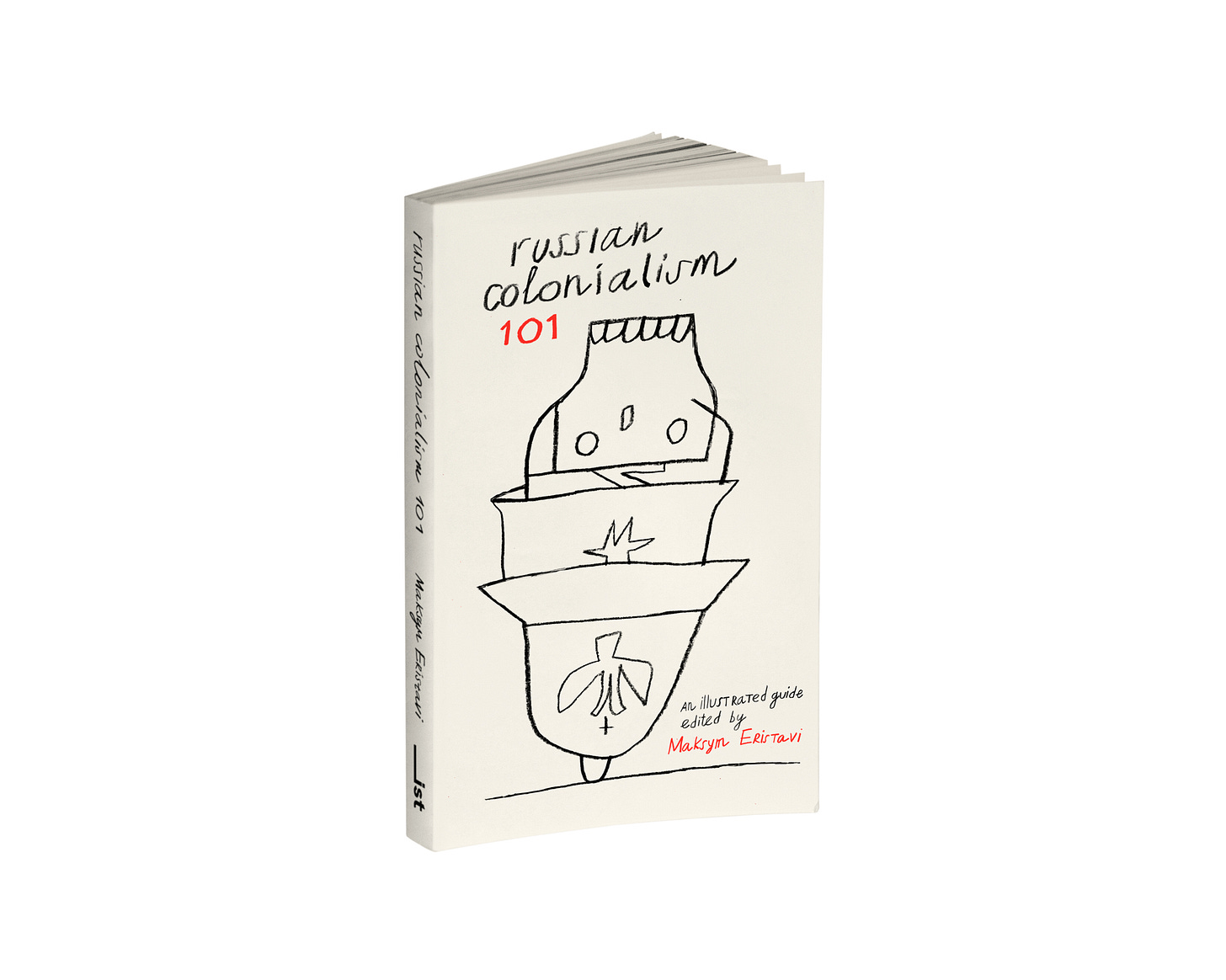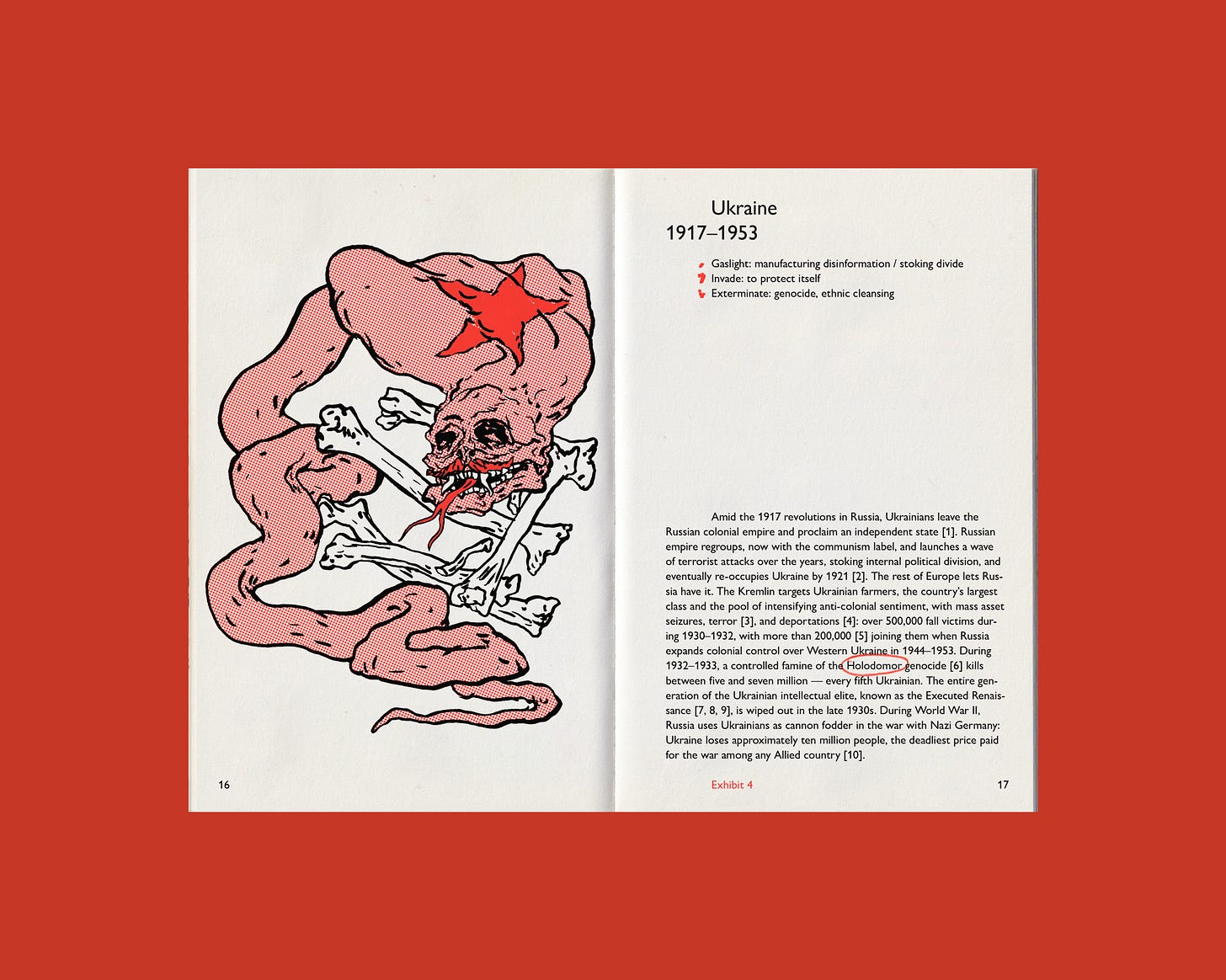russian colonialism 101: a recovering mankurt.
I used to hate myself and my homeland. Now it helps me to explain colonialism.
Russian Colonialism 101 is the first newsletter enlightening you about Russian colonialism. The opening essay is public; the rest is behind the paywall. Your paid subscription will power my mission to mainstream Russian colonialism awareness.
Hey everyone! It has been the busiest summer in my life as I was putting the final touches to ‘Russian Colonialism 101,’ an illustrated guidebook to Russian colonial crimes. After 18 months of hard work, it is finally out for pre-orders (the first deliveries will be shipped at the end of October.) We sold out the first print in a week, so don’t hesitate to get your copy while we still have them.

Making a book marrying journalism and art on such a complex topic was risky (check out my interview about the guide with the iconic Ukrainian Don’t Take Fake magazine ). But it's not as risky as doing it with a dozen artists and the publishing team surviving a genocide in the middle of a war zone. The Kharkiv-based IST Publishing team and the superteam of artists led by Sergiy Maidukov (Alisa Gots, Nikita Kravtsov, Nataliia Kozeko, Danyl Shtangeev, Natasha Steshenko, Ave Libertatemaveamor) - you are my heroes.
“Russian Colonialism 101” does not tell my personal story, but it is my most personal work to date.

While I was putting the guide together, Russian soldiers were marauding my ancestral home in the Zaporizhzhia region — burning Ukrainian-language books and family albums — erasing any trace of Ukrainianness they could find, be it people or street names. Not the first time they have done it to my village. Nor is this the first country or nation they have abused this way. But our stories and our voices have been erased and ignored for years.
This is why the victims of Russian colonialism mostly cannot describe their family tree deeper than a generation or two. This is why we don’t speak the languages of our grandparents. This is why we are often confused about who we are. And when you have an identity amnesia like this, it is easier for the empire to program you with what the colonizer thinks you should be. To program you to hate your ancestry. To hate yourself.
Whenever I talk about Russian colonialism, I remember the Mankurt tale. The word ‘mankurt’ comes from Central Asia. Coined by Kyrgyz writer Chynggyz Aytmatov, it channels an old Turkic legend about a slave tortured to complete amnesia. More generally, it also means any indigenous person ashamed and embarrassed by their roots — a successful case of the colonized consciousness and identity confusion. The word is widely used in Central Asia to describe the trauma of Russian colonial violence.
There’s a stunning animated short film by brilliant Qazaq director Ermina Takenova reimagining the Mankurt tale for nowadays.
The Mankurt tale is a great metaphorical shortcut enriched by indigenous mythology. But it is also deeply personal for me. I was that Mankurt. That’s why the mission — of finding out the truth about ourselves, our roots, what precisely in our worldview is shaped by the colonial domination, and what is authentic — became paramount for me. Through this knowledge, ‘Russian Colonialism 101’ is also the manifest for my decolonization.
The journalist in me is often uncomfortable instrumentalizing my personal story. The Ukrainian in me is often concerned people will start perceiving Ukrainians only through trauma and victimhood. Nevertheless, it is always an effective way to expose the empire and drive home a very complex topic of how colonialism works. It helps to make global waves, too. Here’s a short clip from my recent interview with Taiwan Plus. They’ve just made an entire episode of their primetime show devoted to Russian colonialism.
There have been generations of people who had the same story as mine to tell but were silenced by the Russian colonial empire. ‘Iron Curtain’ is not only about the Soviet Union but also about the centuries-old filter Russia managed to install between the outside world and the people enslaved by Russia. Moscow had a monopoly on explaining to foreigners who we were, where we came from, and what our destiny was. As well as the ability to authoritatively create a mythology about what Russia is and who Russians are. Systematic work to conceal or destroy historical evidence among the colonized communities, such as my village, is an inseparable part of such success.
‘The propaganda which rendered the brutal colonization and the colonized themselves largely invisible to the outside world is perhaps Russia’s most ambitious and successful export. This invisibility provides cover for Russian atrocities and it must be challenged and disrupted,’ recently wrote Qazaq thinker Azamat Junisbai in his very cool essay on the colonial nature of the Soviet Union.
That propaganda is cracking. More survivors of Russian colonialism speak out, creating more significant ripple effects. In one of the recent examples, the Parliament Assembly of OSCE called Russia ‘a colonial empire’ in the official declaration, setting an international precedent. Buried at the end of the document, nevertheless, it will have a huge legal legacy for years to come.
I hope ‘Russian Colonialism 101’ will similarly produce a ripple or two, dragging the empire closer to its death.
The Ukrainian Armed Forces is our best chance to end Russian colonialism. However, amplifying stories of other victims of our shared abuser will accelerate the fall.

here is what's in store for you this week:
a Ukrainian filmmaker serves you with a powerful eye-opener that Russia is a modern colonial state.
how Russian colonialism took the Western anti-imperialist Left for a ride.
how Ukrainian culture and art made the bedrock of Ukrainian anti-colonial resistance.
how Russia turns ‘great Russian culture’ into a tool of colonial subjugation.
how Russian colonialism utilizes the policy of Russified indigenous names for identity erasure.
curious for more? let's go.



